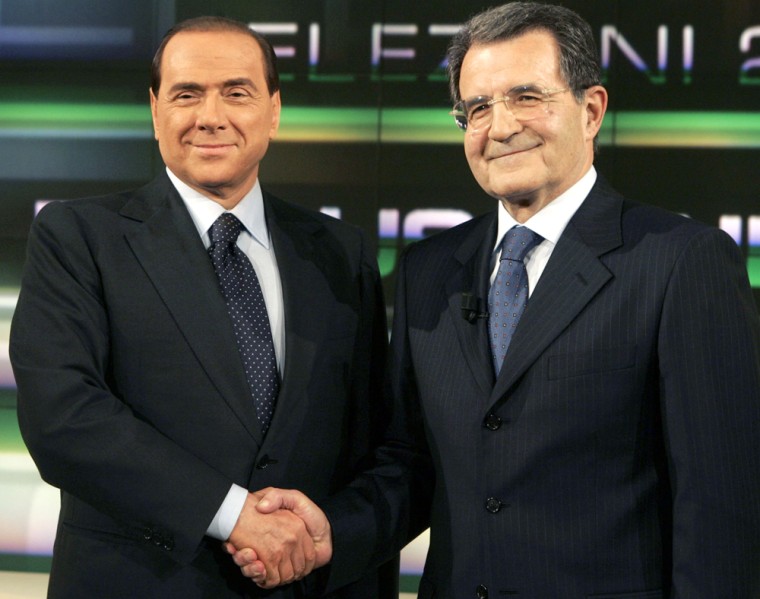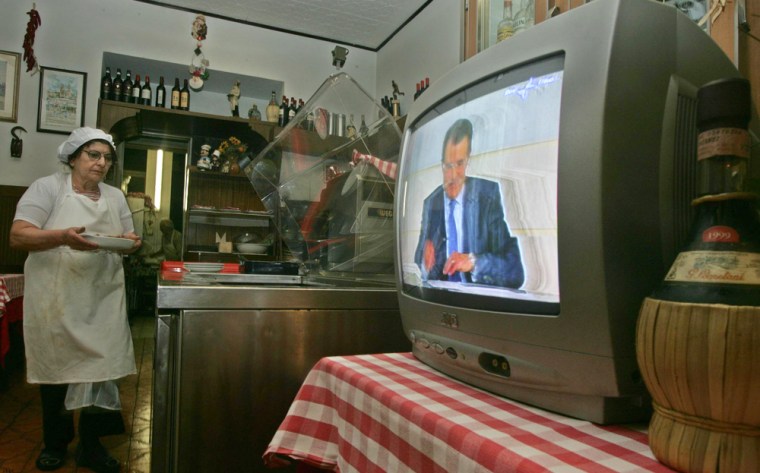ROME — The two biggest political rivals in Italy, incumbent Prime Minister Silvio Berlusconi and his challenger Romano Prodi, faced each other in an unprecedented “American-style" prime time television debate Tuesday night ahead of the April 9-10 election.
Even though the debate garnered an astonishing 52 percent share of available viewers, most Italians are still not sure what to make of all the fuss.
But, one thing is clear, neither leader, nor the new debate format, can command an audience like the classical Italian leading man Marcello Mastroianni.
Class clown vs. the class nerd
Berlusconi is Italy's Rupert Murdoch. A flamboyant self-made magnate with a media empire that includes three national TV networks, newspapers, magazines, advertising conglomerates and even the premier league AC Milan soccer team, Berlusconi goes by the nickname "The Knight," "Il Cavaliere."
The 69-year-old is the richest man in the country and ranks 37th on the Forbes list of billionaires.
Where Berlusconi has the captivating charm of the class clown, Prodi, has the appeal of the gentle-mannered, warm-hearted, hard-working class nerd who sits in the front row with his thick glasses, raises his hand every time the teacher asks a question, blushes deeply when he gets called on, and gets it right.
Prodi's nickname is "The Professor," because indeed he was a university lecturer of economics, but more so because his patient, precise and didactic speaking style makes the listener feel like a student. Prodi, 66, comes from an honorable five-year term as President of the European Union Commission.
Last bout a decade ago
The last time the Professor and the Knight faced each other directly was a decade ago in 1996.
Prodi's center-left coalition won that election. Prodi was prime minister for two years before a series of conflicts within his coalition caused his government to collapse.
The center-left was able to hang on to government control with a succession of shorter-lived coalitions with different prime ministers, then staggered its way to the scheduled general elections of 2001.
Berlusconi's center-right group. (known as the "Casa delle Liberta,” or "House of Liberties,") came to power that year, and held on to power for a record-setting full five-year legislature term.
Still suffering from lira to euro conversion
But, Berlusconi’s rule has come under a great deal of criticism for self-serving law-making that favored his corporate holdings, and more importantly, for mismanaging the Italian economy during the transition from the over-inflated Lira to the euro currency in 2002.
The base unit of Italy's cash system was 1,000 lira, (approximately the equivalent 50 cents in recent years), and was the typical price for a cup of coffee, or a newspaper.

Then, almost overnight, goods that cost 1,000 lire were just rounded up to cost 1 euro - practically doubling what the cost had been in lira (1 euro equaled approximately $1 when euro bank notes and coins went into common circulation in 2002).
With the near doubling in the price of all goods in a matter of months, most middle- and lower-class Italians found themselves unable to make a decent living. The economic disparity was never corrected and continues to this day.
For that reason, more than any other, Prodi's opposition coalition has had a consistent lead in the polls as Election Day draws near.
The exchange in the debate on this topic definitely went to Prodi. As the richest man in Italy, Berlusconi is always on shaky ground when he tries to talk about supermarket prices. Everyone knows he hasn't had to "go to the store," in person, for most of his life.
Berlusconi blamed the euro on agreements he inherited from Prodi's prior administrations, and said there was nothing his government could have done about controlling prices, and that this problem isn't just in Italy, but that it happened all over Europe.
But the Professor was quick with a solid comeback. Neighboring Austria switched to the euro at the same time, Jan. 1 of 2002, and he noted that Innsbruck, Austria, and Bolzano, Italy, are neighboring cities, separated by a border but close enough that residents shop in both towns.
Prior to the euro, prices for daily commodities were for the most part lower in Bolzano, so the Austrians would go to Italy to stock up. Now, Prodi pointed out, it's the other way around, and the people of Bolzano are going to Innsbruck to shop. And that, he said, is an Italian problem, not a European one.
For America lover, no fan of American rules
The television cameras that are normally Berlusconi's biggest ally seemed to fail him this time.
He blamed the "restrictive rules" modeled on American-style political debates. Never before has a clock dictated events on Italian politics on television.
The rules had been hammered out in detail by both sides last week.
Still the Berlusconi camp chafed at the two-and-a-half minute limit on answers to the questions posed by two prominent Italian journalists.
They claimed Berlusconi's expansive, ad-lib style would suffer by having a time constraint, where as Prodi's people welcomed "the rules" like a second-coming.
And indeed, Prodi benefited from the rules, because as the "class nerd,” he believes in, lives by, and veritably loves the rules.
Visibly frustrated, Berlusconi showed his disregard for them by repeatedly going over his time-limit, then ignoring and talking over the moderator who tried to get him to stop talking.
The “Professor” took pleasure in pointing out that Berlusconi is incapable of accepting any rules that don't give him what he wants, in a clear reference to the inherent conflict of interest problems in being both richest man in the land, and its ruler at the same time.
Not the usual WWF bout
For how much Berlusconi professes to love America and everything American, he certainly doesn't like U.S. debating rules. The majority of public opinion polled after the debate, and reflected in Wednesday morning's headlines, felt that Prodi won "on points,” or by "decision" in boxing terms, and not with a knock out punch.
Other Italians said it was boring because of the American rules that did not allow shots of the non-speaking candidate reacting to his opponent. And several of those admitted that it's just no fun if the candidates can't go at each other directly.
The fact remains that the rules prevented the confrontation from getting loud, brash and personal, which is what debating is normally like here.
The traditional Italian political debate would look to an American viewer a lot more like Jerry Springer than McNeil-Lehrer, and the role of the moderator is typically reduced to that of the ridiculed referee in a WWF bout who is completely ignored by the fighters, if not attacked himself.
What was touted as a political Super Bowl and clash of the political titans, proved disappointing to those who expected a "better fight."
The left-leaning newspaper La Repubblica's Washington correspondent, Vittorio Zucconi, speaking on Radio Capital this morning described it as a standoff between the archetypal Italian village roles of the parish priest and the town crier.
Explaining the allusion that the priest won this time by telling the people to come together and get along for the sake of the children, while the town crier shouting in the town square failed to convince his audience to buy what he was selling, because what he was selling is a dream, and the people have figured out that the dream isn't real.
Short on classic Italian drama
A few minutes later a listener sent the radio station a message summing up the feelings of much of that 48 percent of the Italian population that didn’t watch the debate.
The listener, a young woman, explained that she didn’t tune in for the full debate because she and her mother were looking for more classic Italian drama.
"I was sitting on the couch watching Prodi and Berlusconi, when my mother came in, plunked herself down and said, 'Get these two idiots off the screen, I'm sick of both of them! Switch to channel three where they're showing a good movie with Sofia Loren and Marcello Mastroianni!'"
